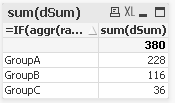Unlock a world of possibilities! Login now and discover the exclusive benefits awaiting you.
- Qlik Community
- :
- All Forums
- :
- QlikView App Dev
- :
- Re: Get sum of largest (by some value) 'x' rows vi...
- Subscribe to RSS Feed
- Mark Topic as New
- Mark Topic as Read
- Float this Topic for Current User
- Bookmark
- Subscribe
- Mute
- Printer Friendly Page
- Mark as New
- Bookmark
- Subscribe
- Mute
- Subscribe to RSS Feed
- Permalink
- Report Inappropriate Content
Get sum of largest (by some value) 'x' rows via an expression
I have a table with cArticle, dSum and some other (irrelevant) fields. Let's say I created a QlikView table with theese two columns and a regular rank:
Now I want to get a sum(dSum) for largest (or smallest or whatever) 'x' rows, where x is a variable. How do I do that? I managed to display such sums in a table:

I did this by having this as a dimension:
=IF(aggr(rank(sum(dSum)), cArticle) <= 3 ,'GroupA'
,IF(aggr(rank(sum(dSum)), cArticle) <= 6 and aggr(rank(sum(dSum),0,2), cArticle) > 3 ,'GroupB'
,IF(aggr(rank(sum(dSum)), cArticle) > 6,'GroupC'
)))
and sum(dSum) as an expression (I only used '3' and '6' numbers for convinience, those should be variables).
But I still can't calculate those sums in a single expression (to show in a text field for example), or apply different math operations based on different rank of cArticle ![]()
When I try to add a column to the last table, it takes rank of the group as a rank, not cArticle's rank as I want![]()
So again, how do I get a sum of largest (or smallest or whatever) 'x' rows, where x is a variable?
- Mark as New
- Bookmark
- Subscribe
- Mute
- Subscribe to RSS Feed
- Permalink
- Report Inappropriate Content
Hi ,
Maybe this analyse will help you
http://community.qlik.com/blogs/qlikviewdesignblog/2013/12/09/pareto-analysis